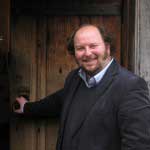PROGRAMME DETAILS FOR THE 189TH SEASON 2012/2013
11 SEPTEMBER 2012
Shakespeare Courses Development Manager
at The Shakespeare Birthplace Trust

Dr.Nick Walton is Shakespeare Courses Development Manager at The Shakespeare Birthplace Trust. He obtained his MA and PhD from the Shakespeare Institute and has taught at the University of Warwick. As Executive Secretary to the International Shakespeare Association he helped organise the Eighth World Shakespeare Congress in Brisbane, Australia in 2006, and the 2011 Congress in Prague.
He regularly reviews Shakespearian productions, and he has written introductory material for the Penguin editions of Timon of Athens and Love’s Labours Lost, as well as contributing a chapter on Glen Byam Shaw to the book Director’s Shakespeare. In 2009 Nick recorded a stage history for the BBC’s website based around the RSC’s production of Hamlet starring David Tennant, and in 2010 he was invited to Boston to deliver lectures and talkbacks to run alongside the Actors’ Shakespeare Project production of Timon of Athens.
Shakespeare Societies: putting a girdle round the earth
Lecture Notes
The 871st meeting of the Shakespeare Club took place at Mason Croft on Tuesday 11 September 2012. The meeting was chaired by Dr Susan Brock who introduced Dr Nick Walton, Shakespeare Courses Development Manager at The Shakespeare Birthplace Trust. As Executive Secretary of the International Shakespeare Association (ISA) he helped organise the 2006 and 2011 World Shakespeare Congresses in Brisbane and Prague. He spoke about ‘Shakespeare Societies: Putting a Girdle Round the Earth'.
The ISA also aims to link the work of Shakespeare societies around the world. Dr Walton began by talking about the history of how groups of Shakespeare enthusiasts have formed societies. From his study of the documents kept at the Shakespeare Centre Library and Archive, he noted that it was a sure sign of the need for a group to have a formal structure when the supply of biscuits and other refreshments became an issue.
Although the Stratford Shakespeare Club is the oldest society in existence, dating from 1824, it was preceded by clubs such as the Shakespeare Ladies Club, a group of intellectual women who, in the 1730s, influenced a revival in Shakespeare performance and contributed to the Westminster Abbey Shakespeare monument.
Other societies were formed for a variety of purposes. The New Shakspere Society founded in 1874 aimed to publish texts for its members. The Shakespeare Reading Club was one of many bringing people together to read the plays. Other groups hold luncheons, organise outings, and screen films. The British Empire Shakespeare Society aimed to promote Shakespeare as a symbol of Britishness, and foreign clubs often had a political purpose, connecting with the wider world while claiming Shakespeare for their own.
Dr Walton's talk ended with a general discussion about the future development of the Club. It was suggested that for its bicentenary in 2024 the Club should apply to regain the Royal patronage it had when first founded. The holding of the 10th ISA Congress in London and Stratford in 2016 gives the Shakespeare Club an opportunity to contribute. Members were encouraged to bring their ideas to future meetings. The meeting closed at 9pm.
CLICK TO GO BACK TO MAIN PROGRAMME LIST |




